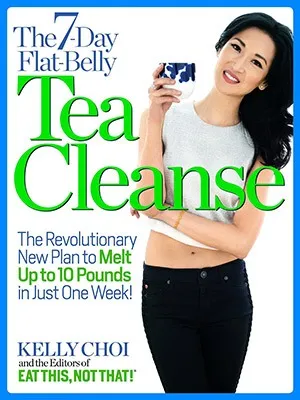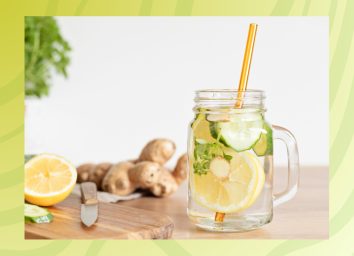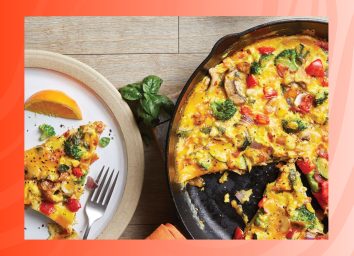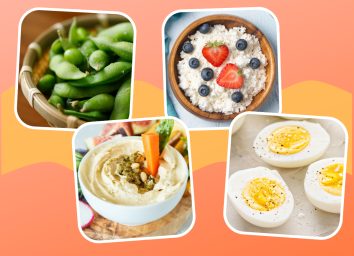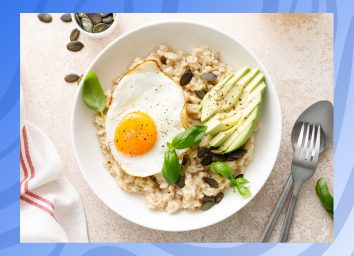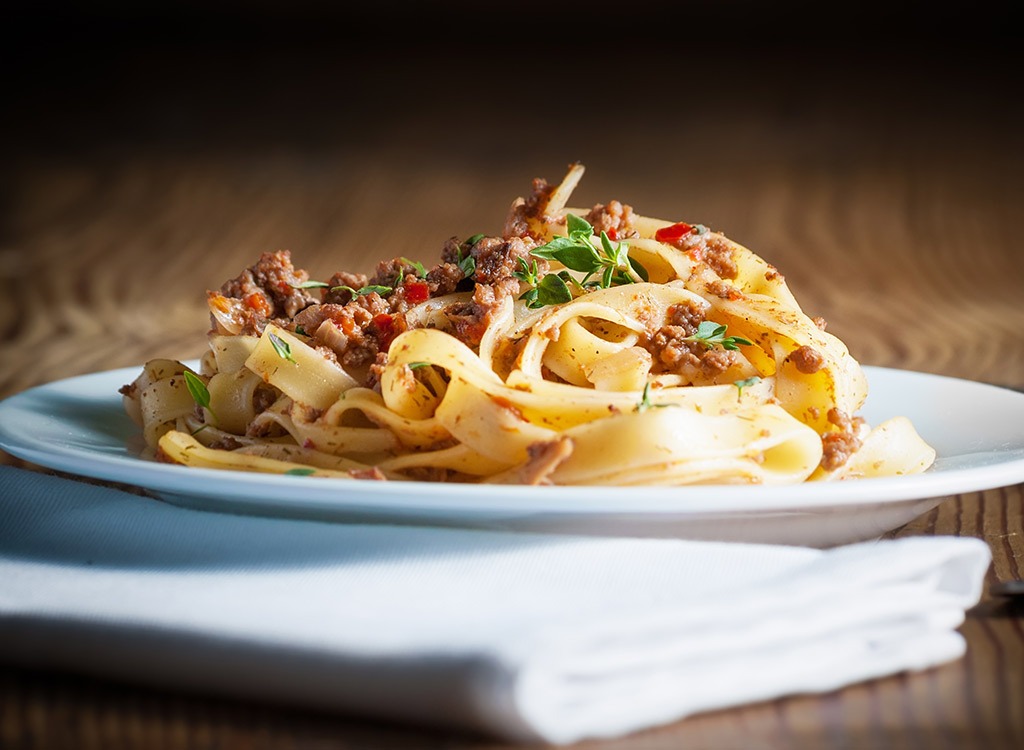
In the 8th century, King Charlemagne passed laws requiring his subjects to consume flaxseed, as he believed so strongly in the health benefits. Smart guy.
Unfortunately though, food police have been getting it wrong just as long. In Shakespeare's day, people believed eating leeks to be as threatening to the health as a gun to the head (researchers now believe compounds in the onion have the potential to prevent and cure deadly illness). Even today, health experts and scientists regularly go back on their word; what was good for us yesterday may in fact kill us tomorrow. It's to be expected that dietary standards will evolve with the times; the trick is keeping up with the news. To avoid the scorn of your great-great grandchildren, here are a handful of nutrition rules you should break today:
OLD RULE #1: Eat Breakfast, No Matter What.
Your mother might have told you that breakfast is the most important meal of the day. Sorry, kids: Mom's not always right. Contrary to popular belief, researchers are now saying that a morning meal doesn't actually kick-start the metabolism and can, in fact, make you gain weight. A new study in the American Journal of Clinical Nutrition had over 300 overweight participants consume diets that included either eating or skipping breakfast. At the end of 16 weeks, dieters who ate breakfast lost no more weight than the breakfast skippers. And a second study in the same journal found regular breakfast eaters not only consumed more calories over the course of the day, but their morning meal had zero impact on resting metabolism.
The Bottom Line: Whether or not you leggo your Eggo as a result of this news is up to you, but understand that eating first thing—while it might provide other health benefits—mounting research suggests it won't do diddly for your metabolism.
OLD RULE #2: Avoid Carbs at Night Time.
Eat noodles after sunset, and watch your belly grow faster than it took the water to boil! Old-school diet theory will have you believe that eating carbs before bed is an express ticket to Fatsville, USA. But in fact, there's a growing body of research to suggest breaking this "carb curfew" can actually help you lose weight and feel fuller. One study in the journal Obesity put two groups of men on an identical weight loss diet. Half the group ate their carbs throughout the day; the other half ate the majority of the meal plan's carbs in the evening. The result? The nighttime carb eaters lost 27 percent more body fat—and felt 13.7 percent fuller—than those on the standard diet. Moreover, inflammation markers in the nighttime group level decreased by 27.8 percent compared to only 5.8 percent in the standard dieters.
The Bottom Line: Late-night pizza, anyone? Eat carbs, as all things, in moderation, but don't feel bound to the clock. Want a pasta dinner? Go ahead! And if you want to decrease the impact on your diet, pop the noodles in the fridge before eating them. This turns the starch into a resistant version that your body has to work harder to digest. No reheating them, though!
OLD RULE #3: Eat Lots of Small Meals.
Snack like a bird throughout the day and turn your body into a calorie-burning furnace! Right? Big fat no. In fact, researchers have linked high meal frequency to the accumulation of excess visceral fat. Unlike "the inch you can pinch," visceral fat wraps itself around vital organs, making it particularly dangerous. A study in the journal Hepatology put two groups of men on weight-gain diets. One group divided the calories among three small meals with snacks in between, and the second group ate the same number of calories in three square meals. While both groups gained weight, researchers found that belly fat only increased in the high-meal frequency group.
The Bottom Line: Don't feel bound to frequent feeding in the hopes of a high metabolism. If that works for you, great! If you prefer two or three larger meals throughout the day, go for it.
OLD RULE #4: Hold the Dressing!
Skipping on salad dressing or opting for a non-fat variety might save you calories, but it'll cost you in the health department, as you'll be missing out on all the fat-soluble nutrients found in fresh vegetables. According to a Purdue University study, monounsaturated fats are superior at helping the body absorb vegetables' carotenoids—magic molecules that protect you from chronic diseases like cancer and heart disease—and as little as 3 grams will do the trick.
The Bottom Line: Stop with the lemon juice and pepper treatment. Help yourself to a little dressing to make the most of your dedication to the salad bar. For the best benefits, dress your greens with a scant tablespoon of olive oil-based vinaigrette.
OLD RULE #5: Ditch the Yolks.
Egg yolks contain dietary cholesterol; this much is true. But research has proven that dietary cholesterol has almost nothing to do with serum cholesterol, the stuff in your blood. Wake Forest University researchers reviewed more than 30 egg studies and found no link between egg consumption and heart disease, and a study in the journal Metabolism found that eating whole egg could improve lipoprotein profiles and insulin sensitivity to a greater extent than yolk-free egg substitute. Moreover, it's the yolk that contains 100% of an egg's carotenoids, essential fatty acids, and fat-soluble vitamins. The white? Goose egg!
The Bottom Line: You've been getting scrambled messages about eggs. If it makes you uneasy to eat the yolks, make your omelets with one whole egg, several egg whites and a bunch of veggies. You'll get the benefits at a fraction of the calories.
OLD RULE #6: Take a Daily Multivitamin.
Hey vitamin fans: if you're poppin bottles with the belief it's improving your health, time to drop it like it's not—at least according to some health experts. A recent editorial in the journal Annals of Internal Medicine suggests that multivitamins provide no long-term health benefit, and actually, "should be avoided." The authors review three studies from the same journal, in which vitamin supplements did not work any better than placebo pills on heart problems, memory loss, or mortality.
The Bottom Line: Some research suggests you can stop wasting money on multivitamins—a multi-billion dollar industry—since there's little evidence to their benefit, and rely on real, whole foods instead for nutrition.
OLD RULE #7: Thoroughly Wash Your Vegetables.
As the saying goes: God made dirt; dirt won't hurt. In fact, adding some dirt to your diet may do wonders for your belly. Dirt contains a form of good bacteria called homeostatic soil organisms—probiotics that keep our gut healthy. A study on IBS patients found supplementing with soil-based probiotics reduced abdominal pain by nearly 18 percent more than a placebo. What's more, studies suggest exposure to a little grime could actually be protective against allergies. While you could shell out on a pricy "soil-based" probiotic supplement at the health store, you could also resist scrubbing organic vegetables and get the same bennies—organic being the key word.
The Bottom Line: Though recent study by Stanford University suggests there's very little nutritional benefit to going organic, there's no denying that the pesticides used on conventional and genetically-manufactured crops have been linked to a slew of belly issues including abdominal pain, nausea and diarrhea. If you have access to a farmers' market where you can ask about what's on your fruits and veggies, even better.
OLD RULE #8: Order from the Diet-friendly Menu.
Marketers know there's a huge amount of money to be made off people who want to eat "healthy" food without compromising on flavor. That's how things like the "Reduced Fat Berry Coffee Cake" at Starbucks become menu staples. But the seemingly healthy breakfast choice packs in 320 calories—plus more than three times the sugar you'll find in the coffee chain's Chocolate Croissant! Adding insult to injury, research suggests just labeling something "low fat" can cause people to overeat. Researchers at Cornell University found study participants ate a whopping 28 percent more of a food item labeled "low fat," than when it didn't have the label.
The Bottom Line: Don't be duped. Nutritional information is available for most chain restaurants online. It's worth doing your homework, so you're armed with guaranteed-healthy choices for your go-to places.
MELT UP TO 10 POUNDS IN ONE WEEK!
WITH OUR BEST-SELLING NEW DIET PLAN, The 7-Day Flat-Belly Tea Cleanse! Test panelists lost up to 4 inches from their waist! Available now in paperback!
